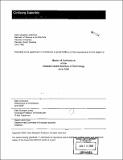Civilizing suburbia
Author(s)
Anderson, Katie Elizabeth, 1970-
DownloadFull printable version (8.979Mb)
Other Contributors
Massachusetts Institute of Technology. Dept. of Architecture.
Advisor
Ellen Dunham-Jones.
Terms of use
Metadata
Show full item recordAbstract
When I began my study of architecture ten years ago, I honestly believed that architecture could change the world. As I look back at how the American landscape has changed since then I realize that architecture has changed the world, but not necessarily in the way I imagined. As our population has grown architecture has reflected the increasing emphasis on consumerism, a decreased interest in public life and even less interest in the natural environment. Consequently terms like suburban sprawl have adequately been coined to describe the spreading wave of decentralized settlement that characterizes our landscape. Even though over 80% of the new homes schools and shopping facilities are now located in the suburbs, many designers still do not consider the suburbs to be within the field of architectural practice. I do not hold to this view and believe that this is where architecture can make the biggest difference and where the greatest opportunity for architects to shape the world may be found. What defines architecture today is not just a question of good or bad aesthetics, but is how the design impacts our culture. With each building, landscape or urban plan we create we have the opportunity to reinforce current values or to establish new values which can lead us to explore more sustainable solutions. This thesis looks at a site in suburban Miami and demonstrates how we can redirect our growth toward the protection of our natural resources and contribute important public space that celebrates the value of our environment.
Description
Thesis (M.Arch.)--Massachusetts Institute of Technology, Dept. of Architecture, 2000. Includes bibliographical references (p. 33).
Date issued
2000Department
Massachusetts Institute of Technology. Department of ArchitecturePublisher
Massachusetts Institute of Technology
Keywords
Architecture.